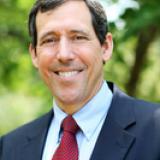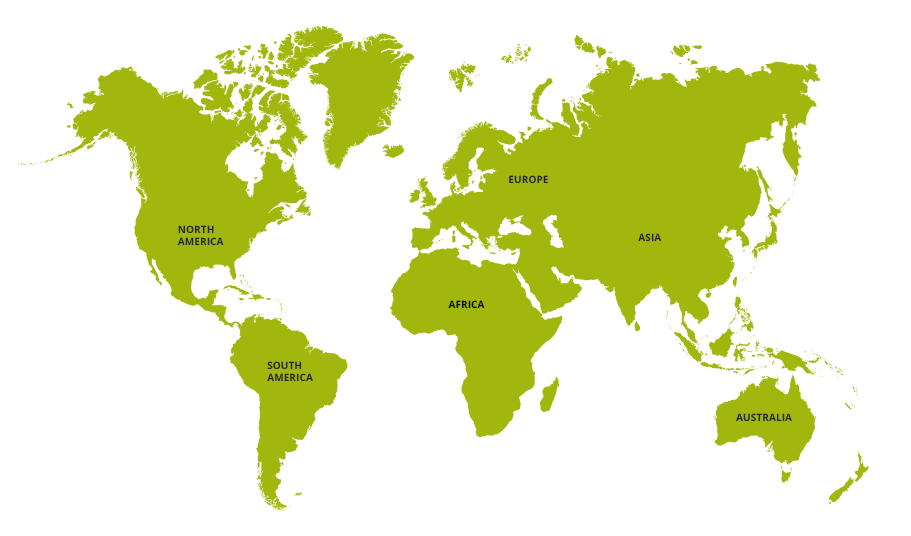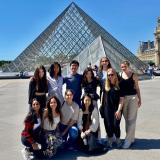Duke in New York
Spring Financial Markets & Institutions
A liberal arts approach to the global financial services industry
Apply NowDuke in New York Financial Markets and Institutions is a liberal arts-based, one-semester program in New York City for Duke undergraduates interested in gaining a deeper understanding of the financial services industry and global financial markets.
The program incorporates four full-credit courses taught by Duke faculty, guest lectures and panels, visits to trading floors, and socials hosted by banks and other institutions. The courses feature a broad-based liberal arts approach to issues of international finance, financial markets, and associated institutions. This includes regulation, government-business relations, supporting institutions, and value and ethical issues.
It is not necessary for students to have prior experience or coursework in finance, nor is it necessary to have the intention of working in the financial field after graduation to participate in the program. Duke in New York Financial Markets and Institutions should be seen as an opportunity for students to become more familiar with the full scope of career opportunities in financial services or regulatory agencies involved in financial markets. Students also gain a strong sense of community created with the many Duke alumni who have eagerly volunteered to participate in the program.
We actively welcome sophomores to apply to this program.
PROGRAM FAST FACTS
Location: New York, New York, USA
Term: Spring
Dates: January 6 - April 23, 2025
Application Deadline: May 15; Second round deadline August 15; Final deadline September 15
Academic Theme(s): Finance
Credit Type: Duke Credit
Eligibility: 3.4 minimum GPA. Open to Duke sophomores from any major. Must have completed ECON 101 and ECON 201D. When ECON 471A is offered, applicants must have also completed MATH 202. Non-Duke students and DKU students are not eligible for this program.
Duke Affiliation: Duke Economics Department
Housing: Residence Hall
GEO Advising: Request an appointment
ACADEMICS
Students will enroll in four courses, each offering one Duke credit. No pass/fail option or auditing is permitted.
FECON 471A
Financial Markets and Investments
(QS,SS) 1.0 Credit
Pre-requisites: ECON 201D or 372; AND ECON 104D, or STA 111L, 130L, 230, or 250D, or MATH 230 or 342D
The structure and workings of financial markets. Topics include risk-return relationships, aspects of portfolio selection, the capital asset pricing model, the arbitrage pricing theory, fixed income analysis, and aspects of derivatives. Instructor: Tim Bollerslev
FECON 307A
Understanding Financial Bubbles and Crises
(SS) 1.0 Credit
Pre-requisite: ECON 101
Examines the similarities/differences of historical financial crises from “Tulipmania” through the Great Recession to better understand our current economic environment. Explores the regulatory changes that are enacted post-crisis and determines factors that might prevent future economic bubbles/crises. Class includes guest speakers from the NY financial community who experienced recent crises from 1987 Black Monday Crash through Credit Crisis of 2008 to provide an inside view and feel of the markets during those periods. Instructor: John Caccavale
FECON 370A
Global Capital Markets
(W, SS) 1.0 Credit
Pre-requisites: None
Financial markets and the role of investment banks as intermediaries. Divisions and functions within investment banks: sales and trading, corporate finance, research and wealth management. Aspects of asset pricing and corporate valuation. Impact of current events on financial markets. Intended primarily for sophomores and juniors interested in a career in financial markets. Instructor: John Caccavale
ART HISTORY 390A
Architecture and Urbanism in New York City
(ALP) 1.0 Credit
This course will explore the history of architecture and urbanism in New York City from the colonial period through the present day. We will study well-known monuments along with lesser-known but important works, and consider the political, cultural, and economic factors that fueled the development of New York’s built environment. Classroom lectures will be regularly supplemented with site visits across the city. Instructor: Andrew Weinstein
This course has been chosen as a different educational experience than the three economics courses and takes advantage of the Duke in New York program's unique and important location.
The following policies regarding course load are in effect:
- Students must enroll in four full courses. No underloads and no overloads are permitted.
- All courses must be taken for graded credit.
ON INTERNSHIPS
Duke in New York Financial Markets and Institutions is not a placement program for internships. In previous years, many Duke in New York students have been successful in securing summer internships. Furthermore, the academic director works with the Duke Career Center and many New York-based finance companies to arrange internship interviews at their New York offices or by phone. However, applicants should be aware that obtaining summer internships in finance is neither the goal nor the purpose of the program.
If you are an international Duke student on a visa (such as F-1) and are considering an internship during the summer following this program, then you should contact the Duke Visa Services Office for important information about obtaining the required OPT/CPT authorization to be compliant with Duke and federal law.
HOUSING & MEALS
Duke in New York students live at the St. George in Brooklyn Heights, one of the safest and nicest premier neighborhoods in the city.
The St. George is managed by Educational Housing Services (EHS), a non-profit company that provides student housing in several areas of New York City. All residents of the St. George are students enrolled at accredited colleges and universities. EHS staff members also live in the building and are on hand at all times to assist student residents.
- Duke in New York students live in the St. George Studio and St. George Weller towers.
- Each room has a refrigerator with a freezer, and a microwave. A central, shared kitchen is available for residents.
- See the Costs section for a breakdown of the room types available and pricing.
Brooklyn Heights
The historic Brooklyn Heights location of the St. George has much to offer, including close proximity to the Brooklyn Promenade, a popular walkway on the East River with great views of the Statue of Liberty, lower Manhattan, and the Brooklyn Bridge. Brooklyn Bridge Park, one of the city’s newest and largest park areas, is also accessible near the St. George.
The area around the St. George has everything to meet students' day-to-day needs, including restaurants, cafés, pharmacies, grocery stores, and banks. Multiple subway lines (2, 3, 4, 5, N, R, A, C, E) are within walking distance, so getting anywhere in the city is easy.
COSTS
Spring 2024
Estimates are based on previous years' programs and the current exchange rate. All costs are subject to change.
| Duke Students | |
|---|---|
| Tuition | $31,725.00 |
| Program Fee | $500 |
| Housing Fee | See below |
| Transcript Fee | N/A |
| Other Costs* | See Cost Sheet |
| TOTAL (Estimated) | $43,585-$44,200 |
*A customizable program cost sheet that includes a breakdown of other costs is available on the programs' MyGlobalEd brochure page.
Explanation of Costs
The program fee for this program includes:
- Accommodations
- Local transportation (monthly metro cards for duration of semester)
- Program-sponsored activities and excursions
- Orientation program
- Access to educational facilities at NYU
- Membership to Fitness Center next to student housing in Brooklyn
The program fee does not include:
- Airfare
- Airport transportation to/from program site
- Meal Plan
- On-site accident and health insurance policy
- Out-of-pocket medical expenses
- Textbooks and class materials
- Mobile phone
- Laundry
- Independent travel and entertainment
- Items of a personal nature
- Incidentals
Double room: $5,010 per semester per student
Please note that only a select number of single rooms are available for any year. Singles are offered on a first-come, first-served basis and are subject to a higher rate.
Personal expenses can fluctuate greatly depending upon habits and preferences of the individual. It’s also wise to budget for unexpected expenses such as medical emergencies. On average, previous students suggest the amount between $1,000 - $1,200 for personal spending.
Step 1: Within 3 weeks of acceptance to the program, confirm your enrollment by submitting the non-refundable $1,000 deposit ($1,040 for non-Duke students). Deposits are payable by check or Student Account E-Check. If you receive Duke financial aid, submit the Deposit Waiver Form in lieu of the deposit. Log in to MyGlobalEd for remittance instructions or waiver form.
NOTE: If you withdraw after committing to the program, there may be financial consequences.
Step 2: Complete all post-acceptance items listed on your MyGlobalEd application, including the Participation Agreement, Pre-Departure Orientation, International Travel Registry, and any program-specific forms.
Step 3: Semester invoices will be sent via email to your Duke email address and to your home email address. Remit payment to the Bursar per due date and address indicated on your online statement. Consult the Duke Bursar's office billing schedule for payment due dates.
Financial Aid
Duke students receiving institutional need-based grant aid are eligible for aid for this program; work-study funds are converted to grants. Students are individually responsible for making the necessary arrangements with the Karsh Office of Undergraduate Financial Support and the Duke Bursar’s Office.
Non-Duke students are not eligible to receive financial aid at Duke and should contact their home institutions for financial aid information.
DATES
Spring 2025
Attendance is required at all classes, excursions, and group events. Given the intense nature of this program, late arrival and/or early departure is not permitted.
- Arrival: January 6, 2025
- Departure: April 23, 2025
Spring Break from March 7-16 with classes to resume on March 17, 2025
Housing Before/After
You will need to make your own housing arrangements if you will be arriving before the program start date.
PROGRAM FACULTY & STAFF
Program faculty director(s) can assist with questions related to program academics, admissions, on-site needs, etc. For all other inquiries, please contact the GEO representative listed.
Faculty Directors


GEO Program Manager



ADMISSIONS
Deadline
- First-round application deadline: May 15
- Second-round application deadline: August 15
- Final deadline: September 15
NOTE: After the second-round deadline, qualified applicants will only be considered on a space-available basis.
This program has rolling admission. Applications will be considered on a first-come, first-served basis until the program fills; after that, qualified students are added to a waitlist and notified of openings. Applications must be received by the deadline to be considered.
Priority: Priority will be given to applicants who apply early and meet the prerequisites.
Minimum GPA: The minimum cumulative grade point average (GPA) required for this program is 3.4
All applicants will be considered without regard to race, color, national or ethnic origin, handicap, sexual orientation or preference, gender or age.
Physical Requirements
Before applying to this program, you should assess and determine if you are physically or emotionally able to participate in the following physical demands required by some of this program’s activities:
- Walking approximately a mile in a day, sometimes for two or more days in a row, sometimes on hilly, uneven, or cobbled terrain
- Climbing and descending stairs
- Using public transportation, including sometimes crowded buses or trains
- Standing during tours and site visits
- Entering into older buildings with narrow and sometimes steep staircases, at times with limited or no access to elevators
- The possibility of warm/hot temperatures while residing in locations without air conditioning
If you have questions or are concerned about these or any other program activities, please contact the Duke Office of Global Health and Safety (oghs@duke.edu)
Duke in New York Program
The Duke in New York program is a year-round academic experience offered exclusively to Duke students. The program consists of three separate tracks, each of which has a distinct theme and requires a separate application. Duke students can elect to enroll in just one track, or multiple. Currently, Duke in New York includes the following tracks:
Information specific to each track, such as housing, coursework, and cost, is on the track-specific website.
APPLY
Start your application early to ensure that it is complete by the deadline! Incomplete applications will not be forwarded to the program directors for consideration.
Submit the following items using MyGlobalEd:
- Online application
- Duke in New York questionnaire (online)
- Official transcript(s) from all colleges and universities attended. First-year students should wait for fall semester grades to be posted before submitting their transcript.
- Personal statement, no longer than one page, explaining why you would like to participate on this program
- Resumé

